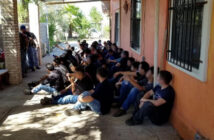Ever since they busted the unions that demanded safer working conditions and better pay, meat-processing and meatpacking plants have been among the most dangerous and exploitative workplaces in America. Beginning in the 1980s, unionized American workers were replaced by immigrant, often illegal alien labor, whose circumstances made it possible for the industry to get away with abhorrent business practices.
“Hourly pay averages as low as $12.50 for backbreaking work, often conducted side-by-side. Workers in the country illegally fear deportation for speaking up,” notes an Associated Press article, They may still not be speaking up, but many are not showing up, reports AP. “Worker shortage concerns loom in immigrant-heavy meatpacking.” The industry, which has gotten away with treating its immigrant labor force as human cannon fodder has, not surprisingly, done little to protect workers in its plants from COVID-19.
As an essential part of the nation’s food supply chain, these plants have continued to operate throughout the COVID-19 crisis with few precautions to protect the people working inside them. That would cost money and eat into the companies’ profits. And why bother when there is an endless supply of exploitable immigrant (many illegal) labor? The industry has come to expect that when workers get sick or die on the job, they can be replaced by more exploitable workers. “With rapid turnover, it’s not uncommon for plants to rehire an entire workforce annually,” the AP reports.
Some 5,000 workers at 115 meatpacking facilities across the country have become infected with COVID-19, and 35 are believed to have died from the virus. Even many workers who were willing to risk job-related injuries are hesitant to fill vacancies in plants where the threat of contracting COVID-19 is high.
In response, the industry is clamoring for more guest workers. Only about 350 H-2B guest worker visas were certified for employment in meatpacking plants in 2019. But with a “looming shortage” of exploitable workers in this country (regardless of immigration status) willing to risk serious illness or death for $12.50 (or less) an hour, the industry is among those demanding that the H-2B supply chain remain wide open.
Which brings us to the other side of the equation – the seemingly limitless number of “immigrant advocacy” groups. Where have they been for all these years as the immigrants on whose behalf they claim to advocate were being maimed in unsafe meatpacking plants and other work sites? Why aren’t they out front in demanding that the government deny these exploitative industries access to guest workers, at least until they adopt practices that will safeguard those who work in their plants from the spread of COVID-19 or other deadly diseases?
The answer is obvious. With few exceptions, they don’t really care about immigrants. They care about mass immigration and how it advances their political and social policy goals. In that respect, they are not all that different from the industries that exploit immigrants for financial gain.





1 Comment
Pingback: Immigration Reform News May 27, 2020 / Qué Pasa En Inmigración - 247 News Around The World